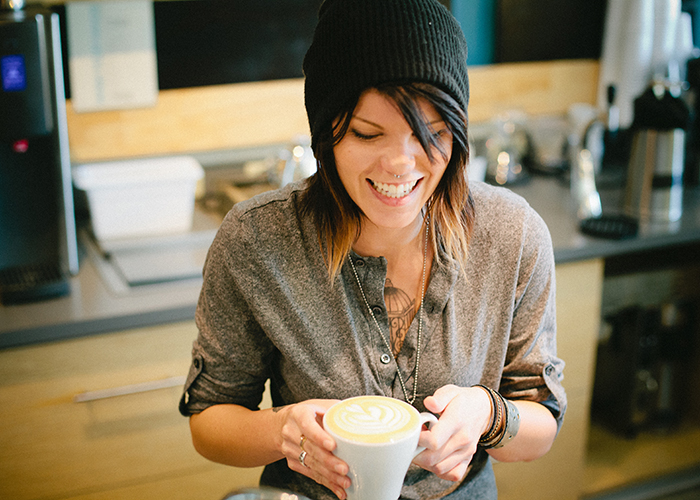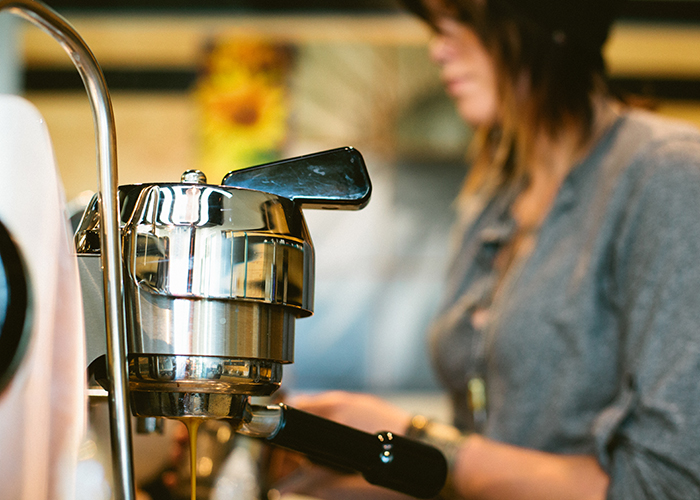Specialty Coffee: Q&A with Kaiti Blom of Revel 77
Posted on October 23, 2014 at 6:00 am
By Aileen Luppert
You could almost miss the coffee shop tucked into one end of a small strip mall. What a shame it would be if you did. Revel 77, with its open layout, hip and welcoming vibe, and some of the best espresso in town is a gem on the South Hill.
Just as hip, welcoming, and valuable, is their rock star barista, Kaiti Blom. Kaiti’s passion for specialty coffee is contagious. In fact, it is so contagious that it inspired SCLD to create a program based on it.
On November 15, 2014, the Library is proudly sponsoring “Sip & Savor.” (Currently, this program is full, but we are working to add another, please add your name to the wait list here and you’ll be the first to know when we do).
The delicious program will be at Revel 77 and feature not only Kaiti, but Karen DeCristoforo from The Chocolate Apothecary. We plan to taste our way around the world and learn about the history of coffee and chocolate. In excited anticipation of this program, I sat down with Kaiti to talk coffee and its culture in Spokane.
How did you get interested in coffee?
My first job was in retail at Paper Garden which was a gift shop in Spokane. They decided to install an espresso machine in the front of the shop. A friend of mine was the manager and asked me to manage the coffee bar. I was 19 and didn’t drink coffee, so I Googled coffee recipes. Most of what I found was for sugary coffee drinks. I went ahead and taught myself how to make espresso and steam milk from YouTube videos. It was a lot of fun.
Later I was hired by another café with specialty coffee drinks and worked one-on-one with the roaster and learned the science of roasting. It made me passionate about the whole thing.
Can you explain what you mean by “specialty coffee?”
Specialty Coffee Association of America (SCAA) describes it as:
“…special geographic microclimates produce beans with unique flavor profiles, which [are] referred to as ‘specialty coffees.’ Underlying this idea of coffee appellations [is] the fundamental premise that specialty coffee beans would always be well prepared, freshly roasted, and properly brewed.”
Specialty coffee is shade grown on sustainable farms, purchased by green buyers, carefully roasted, and prepared properly. Cultivated farms, used by companies like Folgers, are not sustainable. They will go fallow. That may work for them now, but it won’t over time.
Shade grown coffee farms, which can be found all over the world, will last longer because they are in their natural forest, are part of the environment, and stay balanced. With more interest in specialty coffees, the hope is that more farmers will create these kinds of crops and be able to compete.
There aren’t many specialty coffee chains. There are Stumptown and Blue Bottle with shops in Seattle, Portland, and on the East Coast. They are trying to bring qualify specialty coffee to more people.
How did you end up at Revel 77?
I heard about “Thursday Night Throwdown.” It’s a latte art competition in Spokane. I decided to compete. I did poorly in the competition, but came back and later met Mike and Deb Nelson who own Revel 77. I joined them in December of 2012—which was almost at the beginning of the store.
Now I run the coffee program and retail sales. I speak to the wholesalers and decide what to purchase. I place orders and have good relationships with the roasters. I really like the owners, as they allow me to take ownership of my work. I’m part of the community and the pop culture of coffee. They let me do what I want as far as the coffee program and really support specialty coffee.
Tell me more about Thursday Night Throwdown!
It is called Thursday Night Throwdown Inland Northwest. It is a monthly event, usually in the fall and winter. Baristas come and compete in head-to-head bracketed competition for the best latte art. Each person who enters throws in $5.00 and the winner takes all. I still compete, and the new season just started.
The first one I went to was a big event. I didn’t know what to expect and brought my whole family with me. It was at Boots Bakery and was a fundraiser. And it was Halloween so I assumed there would be costumes. Turns out I was only person in costume, but at least I won the costume contest! I met some people in the specialty coffee industry and was invited to come to the next event—and went.
The next Throwdown was a smaller and more intimate event so I was able to talk to more people. I got a feeling for what Spokane baristas are like. It was kind of a small group—but friendly.
Now many of us are friends who hang out. In fact on Friday, a bunch of us are going to a hockey game. It is not a surprise we became friends since we all care about coffee—and not just the taste of it, but where it comes from. These issues are important to us so it makes sense we’d be friends. And we support one another. You’ll often find a barista from one café hanging out in another.
Are there distinct latte art styles among the group? Do you have a style?
Yes, people have styles. I’m not sure how I’d describe mine. Maybe—crisp lines, with lots of tulips. Tulips are a style of pour.
Does Spokane have a “coffee culture?”
Yes, and it is growing. For example, when I went to my first Throwdown in October of 2011, I didn’t know Spokane had a coffee culture. I didn’t know about specialty coffee shops or baristas that really cared about coffee. I’m not sure how I first heard of latte art and the Throwdown, but once I did, I practiced and watched YouTube videos about it.
Now there are at least three specialty coffee shops in Spokane: Revel 77, Coeur Coffee House, and Indaba Coffee.
People outside of Spokane are hearing about us. Sprudge Coffee News & Culture is a well-known website all about coffee. It’s international. In 2013 they featured an article about the Spokane coffee scene. We were featured and still get tourists and visitors who come in to try our coffee after reading about us.
Do you see a “Spokane palate?”
Spokane seems to be stuck in Starbucks coffees—dark and almost burned flavors. I’m trying to educate and help introduce Spokane to the Third Wave of Coffee, where the coffee is more lightly roasted and nuanced. I think I can brew a coffee with dark flavors like chocolate, hazelnut or cinnamon that even those who prefer the darkest possible brew would like.
The library is thrilled to be working with you and the Chocolate Apothecary on a program about coffee and chocolate. What will you talk about?
I will start with coffee history—how it was discovered, how it was introduced as a beverage, how it changed world trade, and what it means to people now.
Then I’ll talk about the three waves of coffee. The first wave was black coffee coming to the masses. “Cowboy coffee” was something everyone drank socially. The second wave brought espresso. It is the Starbucks and Tully’s. The third wave is just starting and it is bringing specialty coffee.
During the program, everyone will be able to sample two difference espressos. One will be the dark roasted old world type—like from Italy. The second taste will be a light roasted specialty kind. The program will finish with discussion about the differences.
I have to ask, what is your personal favorite specialty coffee?
My favorite is Ethiopian beans. They have blueberry or sweet cherry notes. Not to be confused with flavored coffee. Coffee beans come in different varieties. Like there are different kinds of tomatoes that have slightly different tastes, so do coffee beans. The “flavors” come from where they are grown and how they are processed.
Tags: coffee, Kaiti Blom, q&a, Revel 77, Sip & Savor



